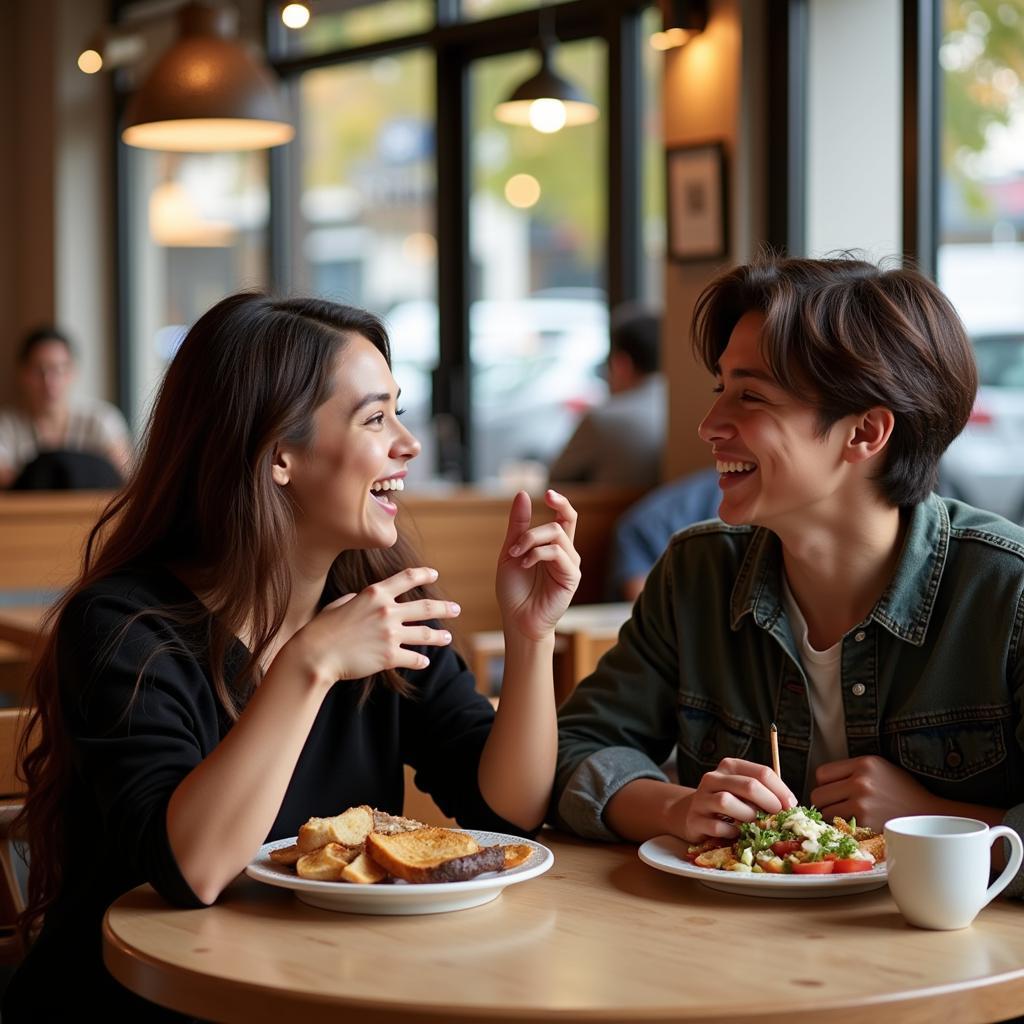“Khana Kha Liya Tumne?” This simple Hindi phrase, often translated as “Have you eaten?”, is more than just a polite inquiry about someone’s meal. It’s a cultural touchstone, a subtle expression of care and connection that resonates deeply within Indian society and amongst the diaspora. It reveals the importance of food as a symbol of love, well-being, and community.
Beyond the Plate: Understanding “Khana Kha Liya Tumne?”
“Khana kha liya tumne?” transcends the literal meaning of asking about food consumption. It delves into the realm of emotional connection, demonstrating genuine concern for another person’s well-being. This seemingly simple question acts as a bridge, fostering intimacy and strengthening bonds. It’s a way of saying, “I care about you,” without uttering those exact words. In a culture where hospitality and familial ties are highly valued, this question becomes a powerful expression of love and respect.
Cultural Significance of “Khana Kha Liya Tumne?”
In many Indian households, “khana kha liya tumne?” is a ritualistic greeting, exchanged between family members, friends, and even acquaintances. It’s a way of acknowledging each other’s presence and expressing a shared sense of belonging. The question is often asked regardless of the time of day, further highlighting its symbolic importance. It isn’t always a genuine inquiry about hunger; rather, it’s a social nicety, a way of showing that you are thinking of the other person.
“Khana Kha Liya Tumne?” and Expressions of Love
Food, in many cultures, is a powerful symbol of love and nurturing. In Indian culture, this connection is particularly strong. Preparing and sharing a meal is an act of love, and asking “khana kha liya tumne?” becomes an extension of that sentiment. It’s a way of ensuring that the other person is taken care of, that their basic needs are met. This question, therefore, embodies a deep sense of caring and affection.
The Nuances of “Khana Kha Liya Tumne?”
While seemingly simple, the question “khana kha liya tumne?” carries nuanced meanings depending on the context and relationship between the individuals involved. Between close friends or family, it signifies deep affection and intimacy. In more formal settings, it can be a polite gesture of courtesy and respect. The tone and inflection with which the question is asked also play a significant role in conveying its intended meaning.
Responding to “Khana Kha Liya Tumne?”
The response to “khana kha liya tumne?” can also be quite nuanced. A simple “yes” or “no” often suffices, but elaborating on the meal or expressing gratitude for the inquiry further strengthens the social bond. It’s an opportunity to share a small part of your day and connect with the other person on a more personal level.
 Friends catching up over a meal: Showing the social aspect of sharing food and conversation.
Friends catching up over a meal: Showing the social aspect of sharing food and conversation.
“Khana Kha Liya Tumne?” in the Digital Age
Even in today’s fast-paced, digitally-driven world, the tradition of asking “khana kha liya tumne?” continues to thrive, finding its way into text messages, phone calls, and even social media interactions. It serves as a reminder of shared cultural values and the enduring importance of human connection.
“Khana Kha Liya Tumne?”: A Timeless Tradition
“Khana kha liya tumne?” is more than just a question; it’s a cultural tradition, a testament to the enduring power of human connection. It reflects the importance of food as a symbol of love, care, and community. It’s a simple yet profound way of saying, “I’m thinking of you,” and reinforcing the bonds that tie us together.
 A person talking on the phone: Illustrating how the tradition persists even in digital communication.
A person talking on the phone: Illustrating how the tradition persists even in digital communication.
Expert Insight from Dr. Anjali Sharma, Cultural Anthropologist:
“‘Khana kha liya tumne?’ encapsulates the essence of Indian hospitality and the significance of food in building relationships.”
Expert Insight from Mr. Rohan Khanna, Linguist:
“This simple phrase transcends its literal meaning, acting as a social lubricant and a powerful expression of care.”
Expert Insight from Mrs. Priya Patel, Sociologist:
“The question reflects the collective nature of Indian culture, where the well-being of others is deeply intertwined with our own.”
Conclusion: The Enduring Power of Connection
The question “khana kha liya tumne?” reminds us of the importance of nurturing our relationships and expressing care for one another. It’s a timeless tradition that continues to resonate deeply within Indian culture, reminding us of the power of simple gestures in strengthening the bonds that connect us. So, the next time you hear this question, remember that it’s more than just an inquiry about food; it’s an expression of love, connection, and belonging. “Khana kha liya tumne?”
FAQ
- What does “khana kha liya tumne” mean?
It means “Have you eaten?” in Hindi. - When is it appropriate to ask this question?
It can be asked at any time of day, as a greeting or an expression of care. - How should I respond to this question?
A simple “yes” or “no” is fine, but elaborating on your meal can further enhance the interaction. - Is this question only asked within families?
No, it can be asked between friends, acquaintances, and even colleagues, depending on the context. - Why is this question considered important in Indian culture?
It reflects the cultural emphasis on hospitality, caring, and the importance of food in building relationships.
Related Questions and Further Reading on ViperCircle:
- Exploring the Cultural Significance of Food in India
- Understanding Indian Etiquette and Customs
- The Power of Language in Building Relationships
Need further assistance? Contact us at Email: Contact@ViperCircle.com address: G-5, लोअर परेल, सेनापति बापट मार्ग, मुंबई, महाराष्ट्र – 400013, भारत।. We have a 24/7 customer support team.